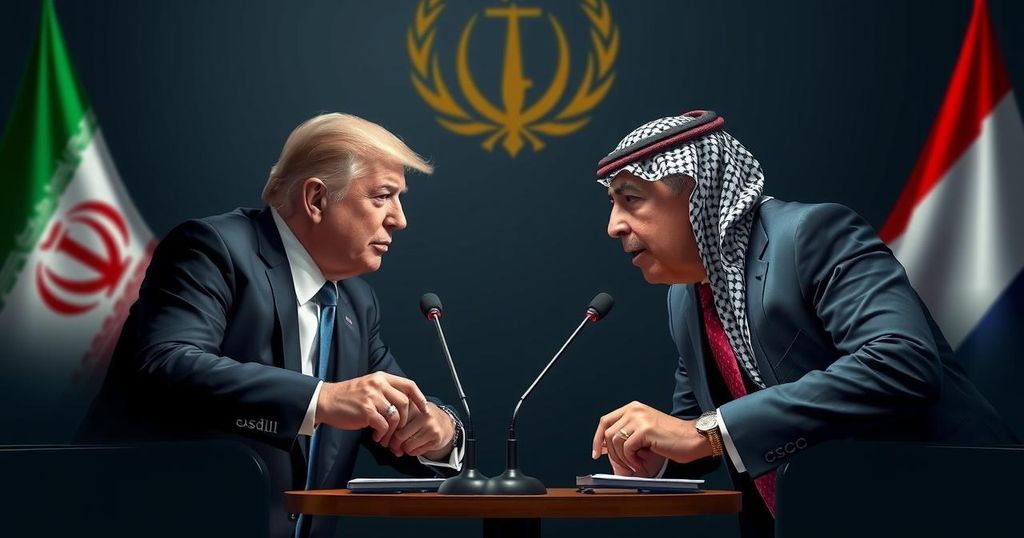Recent talks between the U.S. and UAE suggest a potential lifting of sanctions against Syrian President Bashar al-Assad if he distances himself from Iran and halts arms routes to Hezbollah. These discussions are influenced by the upcoming expiration of U.S. sanctions and developments in Syria that reflect a weakening alliance with Iran. The UAE has sought to re-establish Assad’s position within the Arab community, amidst ongoing geopolitical shifts.
The United States and the United Arab Emirates are reportedly contemplating the removal of sanctions imposed on Syrian President Bashar al-Assad if he chooses to sever ties with Iran and halt the flow of weapons to Lebanon’s Hezbollah. This dialogue has reportedly gained momentum recently, partly due to the looming expiration of extensive U.S. sanctions set for December 20, and as a strategic response to Israel’s campaign against Iran’s influence in the region.
The discussions emerged prior to a noteworthy rebel assault on Aleppo, indicating a potential weakening of Assad’s connections with Iran—a situation that the U.S. and UAE initiative aims to leverage. However, a reciprocal move from Assad to bolster his alliance with Iran could challenge these diplomatic efforts. Iran’s foreign minister recently demonstrated support for Assad during a visit to Syria, and ongoing telephone communications between UAE President Sheikh Mohamed bin Zayed Al Nahyan and Assad signify continued engagement between the two countries.
Previously, the UAE has played a pivotal role in reintegrating Assad into the Arab fold, especially since Assad relied on Iranian support amid the Syrian civil war that ignited in 2011. However, U.S. sanctions have hindered the UAE’s attempts to foster ties with Syria, as the regime continues to be shunned by many Arab states due to its association with Iran. Thus, the UAE’s ongoing efforts to encourage Assad to decouple from Iran coincide with talks of sanctions relief, as the U.S. assesses the implications of allowing sanctions to expire without renewal.
The U.S. sanctions, enacted following Assad’s brutal crackdown on protests, target various sectors of the Syrian economy, and opposition has emerged within the U.S. Congress regarding the potential for their expiration. Some regional actors, including the UAE and Saudi Arabia, have reportedly proposed financial incentives to facilitate Assad’s disassociation from Iran, with Washington involved in these negotiations. Yet, Iran has responded cautiously, urging Assad to remain aware of the historical context of their alliance as tensions continue.
The backdrop of these discussions includes a complex geopolitical landscape where both the United States and the UAE are exploring avenues to mitigate Iran’s influence in Syria, particularly through Assad. The UAE seeks to rehabilitate Assad’s standing in the Arab community amid concerns over Iran’s regional ambitions, while the U.S. views potential sanctions relief as a strategic tool to influence Assad’s alignment. With the expiration of significant sanctions approaching and recent developments on the ground, these conversations underscore efforts to reshape alliances within the region. Moreover, the ongoing conflict dynamics, such as the retreat of Hezbollah fighters and the recent rebel offensive, create shifting power balances that could serve as leverage for U.S. and UAE initiatives aimed at weakening Iran’s foothold in Syria. The situation remains fluid, as various stakeholders navigate their interests and the implications of these diplomatic engagements.
In summary, the ongoing discussions between the United States and the UAE regarding the potential lifting of sanctions on Bashar al-Assad highlight a strategic pursuit of redrawing alliances within the Middle East. Both nations appear to be leveraging the imminent expiration of U.S. sanctions to encourage Assad to reconsider his relationship with Iran and Hezbollah. While the dynamics on the ground remain volatile, these efforts illustrate a broader goal of reshaping the balance of power in the region, amid ongoing concerns regarding Iranian influence.
Original Source: www.usnews.com






